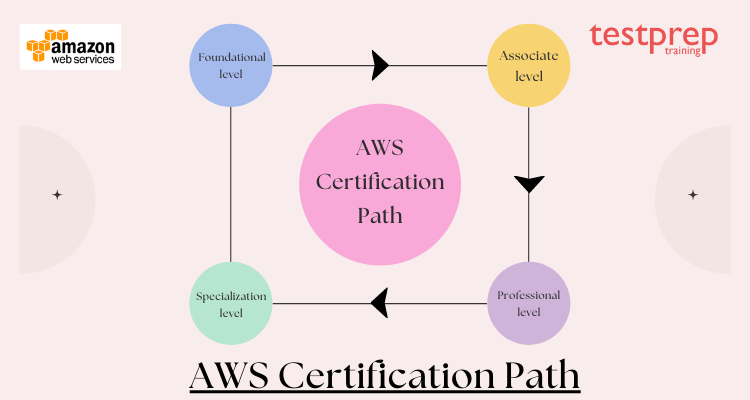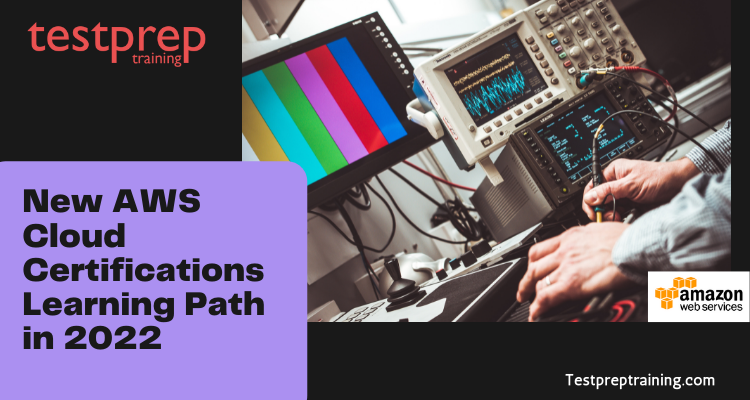In order to become an AWS certified professional it is important to gain technical expertise and become familiar with cloud computing technology. You must also have a solid understanding of AWS cloud services in order to support cloud operations in different verticals and industries. AWS certifications can assist candidates, freshers as well as professionals, in expanding their knowledge and cloud skills in order to work efficiently with AWS services and solutions in an enterprise environment. It indicates that the candidate is well-versed in cloud architecture, management, and security. It can also assist senior professionals in demonstrating their technical knowledge and competence in the AWS cloud. Let us now look at the learning path for the AWS Cloud Certifications.
The AWS certification path is divided into three levels: foundational, associate, and professional. Furthermore, it provides specialization courses that focus on specific job skills in greater depth.

1. Foundational level
Professionals can pursue the AWS Certified Cloud Practitioner certification at the foundational level of the AWS learning pathway.
- AWS Certified Cloud Practitioner: AWS Certified Cloud Practitioner: This course is appropriate for individuals who have a basic understanding of the AWS cloud platform. Candidates should have at least six months of industry experience in the AWS cloud domain before taking this test. This exam focuses on the core components of the AWS cloud, such as how to manage global infrastructure, underlying architectural principles, the AWS value proposition, basic security and compliance aspects, pricing structures, and so on.
2. Associate level
Following that, professionals can pursue three associate-level certifications. This includes the courses AWS Certified Solutions Architect, AWS Certified Developer, and AWS Certified SysOps Administrator.
- AWS Certified Solutions Architect: Participants must demonstrate their ability to plan, oversee, and organize AWS implementations in order to obtain this certification. Candidates are expected to discuss infrastructure management and related topics during the examination. As a result, they must be knowledgeable about IT infrastructure engineering, AWS utilization data management, structural plans and standards, capacity optimization, utilization measurement throughout project lifecycles, and so on.
- AWS Certified Developer: This certification requires a strong understanding of programming languages, as well as an in-depth understanding of the AWS admin console and critical AWS engineering best practices. Furthermore, one must be familiar with the ideal sequence of events, the configuration and analysis process of cloud-based programs, and other relevant software development concepts.
- AWS Certified SysOps Administrator: The systems operations or SysOps administration certificate focuses on production environments and how to maintain them. Candidates should learn about AWS application hosting, information movement between server farms and AWS, selecting the appropriate AWS administration for the associated requirements, AWS cost vs. use analysis, and operational cost control tools.
3. Professional level
After completing the foundational and associate levels, you are eligible for AWS professional certifications. At this point, you have two choices: AWS Certified Solutions Architect – Professional or AWS Certified DevOps Engineer.
- AWS Certified Solutions Architect – Professional: This certification is open to professionals with two years of experience as a solution architect in the cloud industry. It is recommended (but not required) that you pass the AWS Certified Solutions Architect – Associate exam before taking this test. This test assesses one’s skills and abilities in a variety of areas, including cloud application prerequisites, cloud engineering planning and organization on AWS, cost-cutting tactics, and so on.
- AWS Certified DevOps Engineer: To pass this certification exam, you should have at least two years of relevant experience delivering and supervising AWS designs. Before taking the certification exam, there are two preliminary options. Depending on their career path, individuals must either pass the AWS Certified Developer – Associate exam or the AWS Certified SysOps Administrator – Associate exam. An AWS Certified DevOps Engineer works on continuous delivery (CD) strategies, log frameworks, and other related tasks.
4. Specialization level
After obtaining foundational, associate, and professional level certifications, a candidate can advance to specialization opportunities. At this level, they have a choice of four options.
- AWS Certified Machine Learning: Candidates should have at least two years of experience with machine learning (ML), as well as deep learning design and events. They should also be able to handle ML workload exceptions with AWS cloud tools. The certification validates your knowledge of planning, implementing, and maintaining machine learning setups on AWS.
- AWS Certified Advanced Networking: This certification validates a candidate’s ability to manage complex network and system-related tasks on AWS. You must have AWS Certified Cloud Practitioner certification or any other associate-level certifications, such as architect, operations, developer, and so on, before deciding on this certification. This certification exam requires at least five years of experience in the design and implementation of enterprise network topology.
- AWS Certified Data Analytics: This course validates an individual’s aptitude for data analytics as well as their ability to create and present big data analyses using AWS services. People must have at least five years of experience in data science and business intelligence tools, as well as at least two years of active experience in AWS infrastructure, before taking this exam.
- AWS Certified Security: This certification validates your knowledge of AWS security. The candidate must have at least two years of experience implementing cloud security measures in order to obtain this certificate. They should also have at least five years of experience developing and deploying security tools using proprietary and open-source code repositories.
Exam Format and Cost
Subject matter experts meticulously design the AWS certification exams to assess a candidate’s knowledge, skills, and ability to use AWS products and services. A content overview covering the exam guidelines (domains, goals, and the proportion of questions in each domain) is available for each exam. The exam manuals are available for download from the AWS certification website. Although it is possible to attempt an AWS certification without any prerequisites; the company recommends that you have the necessary hands-on experience for each test. It also offers training courses and tools to help you gain the knowledge and skills required to pass each certification.
Applicants between the ages of 13 and 17 are also permitted to take the AWS certification exams; with the permission of a parent or legal guardian. An examination typically consists of 65 multiple-choice questions and lasts 130 minutes. One can expect the following coat structure –
| Certification Level | Fees |
| Foundational certification | Approximately $100 |
| Associate certifications | Approximately $150 |
| Professional certifications | Approximately $300 |
| Speciality certifications | Approximately $300 |
Final Words
AWS certification helps professionals gain credibility and confidence by ratifying their cloud competence with an industry-recognized accreditation. It helps experienced professionals obtain various types of AWS credentials based on their qualifications. Amazon offers certifications for a variety of roles, including cloud practitioners, architects, developers, and operations personnel. It also provides a variety of specialization options for demonstrating advanced skills in a wide range of technical fields.
Individuals interested in a career in cloud computing will find a plethora of opportunities at AWS. AWS skills are in high demand, and the certifications have a high level of industry credibility; allowing candidates to hit the ground running and discover new career paths in 2022.

